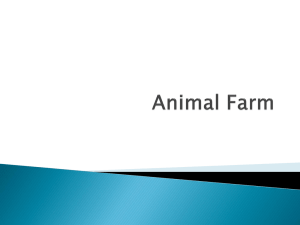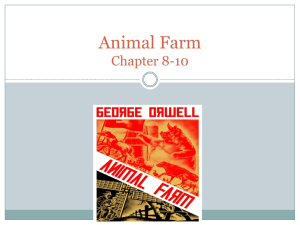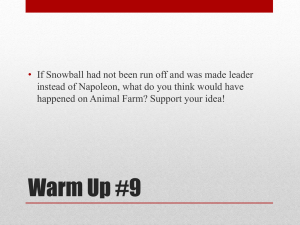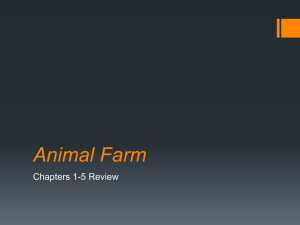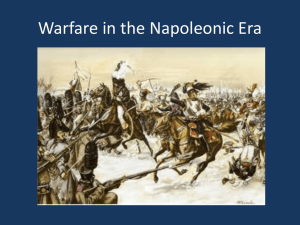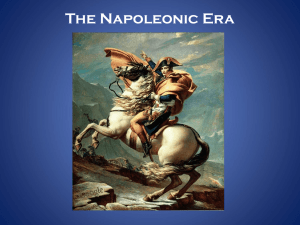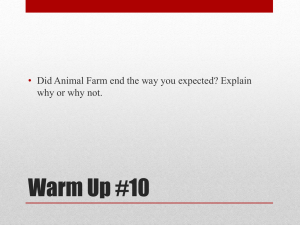Animal Farm
advertisement
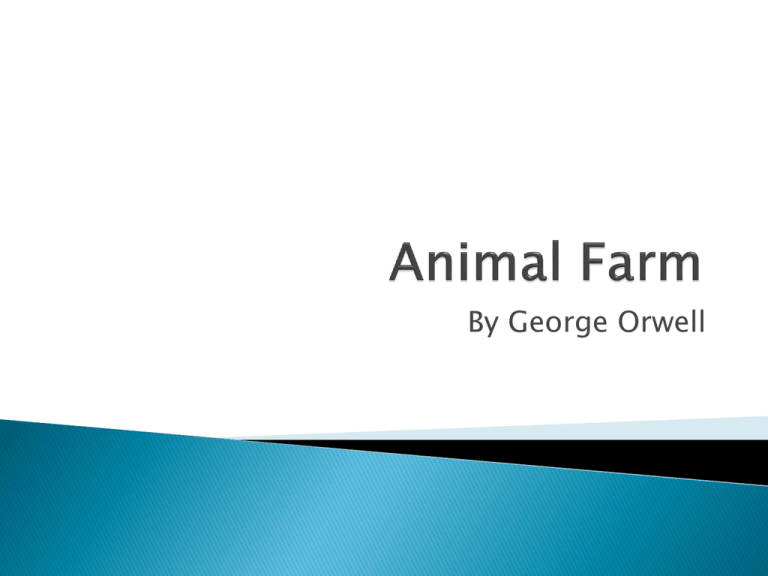
By George Orwell May be read on four levels: (1) An entertaining animal story, fable, or (as Orwell himself called it) a fairy story. (2) A history of the development of Communist theory under Lenin and Stalin. (3) A history of Russia including its foreign relations from the October Revolution (1917) to the uneasy relationship between Russia and the Western democracies as the Second World War drew to its close (1944-45). (4) An account of the way revolutions are made and subsequently corrupted, of the way men form political societies and exercise power in those societies, and finally, an illustration of the famous dictum on the nineteenth-century British historian Lord Acton: “Power corrupts, and absolute power corrupts absolutely.” Satire – a literary work holding up human vices and follies to ridicule or scorn with the goal of improving human institutions. Fable – a story in which animals speak and act like human beings. But “fable” can also mean “a story which was once believed but has since turned out to be untrue.” Animal Farm is thus a fable of Communist revolutionary ideology; part of its structure involves a movement by certain animals on the farm away from that which was believed to be objectively true (Marxist ideology, on which the Russian Revolution was presumably based), toward the weakening and ultimate death of belief in such ideology, and finally its replacement by a sham used to keep the less intelligent members of its community from finding out the truth. Orwell never uses the words Communism, Russia, Germany, Marx, Stalin, Lenin, or Trotsky. How do we know that he meant for readers to draw political meaning out of the story? First of all, the similarities are too strong to ignore. (Isn’t there a disclaimer at the beginning of South Park that says the show is not about real people?) Secondly, Orwell stated himself that he meant the book to have a political purpose. One of his purposes in using beasts is to portray that the actions of men in their political communities are often no better than beasts. Orwell’s satire is less pessimistic than Jonathon Swift’s in Gulliver’s Travels. Swift comes across in some places as being completely disgusted with humanity. Man’s follies and his almost limitless capacity for being duped and tricked are both funny and tragic to Orwell, but in Animal Farm he keeps the humor and tragedy in balance. 1984 has less humor. Orwell reduces the history of the Russian Revolution and the historical characters and events down to the scale of a farmyard. He wants the readers to take a closer look at the politics and the consequences of Communism (anywhere – not just in Russia). Manor Farm = Imperial Russia prior to 1917. Mr. Jones = The Tsar (Nicholas II, the last Tsar of Russia who was executed by the Russian revolutionaries in 1918). An incompetent ruler, he has lost control of the farm. He must be replaced, according to Major, but who will replace him? Major = Karl Marx + Vladimir Lenin. Talks about the oppressed condition of the animals (the workers) and introduces them to a new and stirring revolutionary song, “Beasts of England” (which represents the Communist Internationale). Arise ye prisoners of starvation Arise ye toilers of the earth For reason thunders new creation `Tis a better world in birth. Never more traditions' chains shall bind us Arise ye toilers no more in thrall The earth shall rise on new foundations We are but naught we shall be all. Chorus Then comrades, come rally And the last fight let us face The Internationale Unites the human race. Karl Marx (1818-1883) – Prime theoretician of Communism and proletarian (laboring class) revolution. Wrote The Communist Manifesto. The first line is this: “The history of all hitherto existing society is the history of class struggles.” Another famous quote: “From each according to his ability, to each according to his needs.” Vladimir Lenin (1870-1924) – Saw the Revolution into being but rules Russia after the Revolution for less than seven years, dying prematurely at age 53 and leaving to others the task of completing the work of the revolutionary government. Major’s speech sounds very Marxist. The animals (the workers, “proletariat”) are the only producers, while man (the bourgeoisie, or middle class) consumes without producing. Man enslaves animals. (What would Marx think?) The animals should therefore revolt against man and his domination. Major: “Even when you have conquered man, do not adopt his vices.” (Marx wanted to remove the class system and instate a form of government where all were equal.) Major: “All animals are equal.” 1. What is significant about how the animals arrange themselves as they gather to hear Major? What might this arrangement say about future meetings or events? 2. According to Major, what is the cause of all the animals' problems? 3. What motto does Major give the animals? 4. What are the commandments Major gives the animals? Can you think of ways each of them could be considered a vice? 5. Why do the animals like the song "Beasts of England" so much that they memorize it on the spot? To what emotions and needs does it appeal? 6. What's the name of the farm? 7. In one word, what is Old Major's message to the animals? 8. Who were voted in as comrades? 9. Who was the farmer? 10. What did the singing do? Manor Farm → Animal Farm Russia → Union of Soviet Socialist Republics (U.S.S.R.) Communism → Animalism ◦ Napoleon, Snowball, and Squealer elaborate Major’s teachings into a complete code of behavior and system of thought which they call Animalism. Moses tells the animals of a shadowy nevernever land called Sugarcandy Mountain, to which the animals go when they die – meanwhile, they should continue to work uncomplainingly for their human masters. Moses = Orthodox Church which was disestablished in Russia after the downfall of the Tsar. (The pigs manage to argue most of the animals out of belief in such doctrines, and when Jones is driven off the farm, Moses goes after him flapping his wings.) Karl Marx: “Religion is the opium of the people.” Mollie – Still hopes to be able to wear a ribbon, as she likes ribbons. Snowball cautions her that ribbons are clothing and the mark of human beings. She discards the ribbon, but is not really convinced. Mollie = petty bourgeoisie that fled from Russia a few years after the Russian Revolution. Whatever goes upon two legs is an enemy. Whatever goes upon four legs, or has wings, is a friend. No animal shall wear clothes. No animal shall sleep in a bed. No animal shall drink alcohol. No animal shall kill any other animal. All animals are equal. What happens to it? This is the first of many unexplained events. We don’t know, but we can guess. Pretty obviously, the pigs have disposed of it, either by selling it or more likely consuming it themselves. The pigs are emerging as the leaders. Remember what Lord Acton said – “Power corrupts, and absolute power corrupts absolutely.” Basically, with power comes corruption. Keep an eye on the pigs. 1. After Major's death what happens to the idea of rebelling against man? 2. Why don’t the pigs like the pet raven Moses' stories about Sugarcandy Mountain? 3. What causes the animals to finally rebel against Mr. Jones and his four farmhands? 4. When the humans have been chased from the farm, what do the animals do? 5. What do the animals do to the farmhouse? 6. How does the behavior of the pigs foreshadow their eventual leadership positions? 7. What two pigs were emerging as leaders? Describe each of them. 8. What name did they give to old major's teachings? 9. What animal committed the first rebellious act? What did he or she do? 10. What had the pigs taught themselves to do? How? 11. What was the name of the farm? 12. List the Seven Commandments. The new society is supposedly classless, which is the kind of society Marx imagines as the goal of Communism. But even this early, the pigs seem aloof from the others. Instead of actually working, they “directed and supervised the others.” They are the self-appointed leaders in a society of “comrades” where there should be no leaders. They alone are the ones who present the resolutions. Most of the animals are much happier than they were under human control. Almost all work harder, and the harvest is done more quickly and is much more abundant. Most of the animals are happy to work more. Boxer starts getting up earlier and does the work of three horses. Remember, they are working for themselves and not for cruel masters. Boxer = unthinking masses. He is extremely loyal to the farm, but he is not clever enough to think for himself. He is a follower but is still valuable because of his tremendous work capabilities. The cat – Vanishes at certain times in order to avoid work. Tries to use the teachings of Animalism to her advantage (telling birds that all animals are equal and that they’re welcome to perch on her paw). Benjamin – Does exactly as he had done under Mr. Jones, never volunteering and never doing less. Offers no opinions. Mollie – Gets up late and leaves work early for trivial reasons. Snowball is a great organizer, but his committees designed to educate and improve the other animals meet with limited success. Most can’t read for themselves, so they will be dependent on the pigs. Many are even so stupid that they can’t even memorize the Seven Commandments. Snowball reduces them down to one maxim: “Four legs good, two legs bad.” It’s interesting to note that Napoleon doesn’t even try to educate the older animals. He focuses his attention on the young, taking the nine new puppies away to educate them himself. This is another unexplained event. Green tablecloth with a white horn and a white hoof. Green represents green fields of England, while the hoof and horn represent the future republic of the animals. USSR’s flag – Red background with a yellow hammer and sickle and a yellow five-pointed star. Red represents the blood of the workers that has been spilt in the fight for their emancipation. The sickle represents the peasants and the hammer represents the workers. Notice that they are together; a unity of peasants and workers formed the Soviet Russian state. 1. What further examples of the difference between the pigs and the other animals occur in these two chapters? 2. What are Napoleon's ideas about education? 3. Did the pigs actually work? Discuss. 4. How long did it take the animals to do the harvest? 5. What was Boxer's personal motto? 6. Describe Animal Farm's flag. What did it represent? 7. Describe the ceremonies that took place on Sundays. 8. What did the pigs use as their headquarters? 9. To what extent did Boxer learn the alphabet? 10. What single sentence did Snowball reduce the 7 Commandments to? 11. Who repeatedly talked to the animals on behalf of the pigs? 12. What were the animals completely certain of? Napoleon and Snowball have been spreading the news of the Revolution to the neighboring farms by means of pigeons, who have been subverting the animals on those farms and teaching them the anthem “Beasts of England.” Many nations feared the spread of Communism, including Germany, England, and the United States, to name a few. Luckily for Animal Farm, its two neighbors are enemies and cannot agree even though they’re both in danger. Otherwise, Jones (Nicholas II) might have had more outside help in suppressing the Revolution. Mr. Pilkington of Foxwood = Winston Churchill of England. Pilkington is an easy-going farmer for the most part, but he does not get along with Frederick. Mr. Frederick of Pinchfield = Kaiser Wilhelm (and Adolph Hitler) of Germany. He is a tough, shrewd man, always involved in lawsuits; has a name for driving hard bargains. At first, the two neighbors of Animal Farm are too busy with their own quarrel (World War I) to pay much attention to what is going on at Animal Farm (Hitler was not involved in World War I). They laugh at the experiment, but when they see Animal Farm flourishing and when their own herds give evidence of rebellion and learn “Beasts of England,” they conclude that they must take action. The Battle of the Cowshed corresponds to attacks of both internal and external enemies of the new Soviet regime. March 3, 1918, Germany and other countries of the Central Powers in the First World War were battling Russia, and Russia signed the Treaty of Brest-Litovsk with Germany, settling temporarily with one of its enemies (at great cost). In addition, there was civil war in Russia. By August 1, 1919, Russia was deep in civil turmoil. White Guards (White, as opposed to Red, armies were composed of Russians loyal to the Tsar) were fighting inside Russia. This war lasted four years (1917-1921), but the White forces were finally defeated. Snowball = Leon Trotsky. Lenin appointed Trotsky as Commissar of Defense, where he founded the Red Army (Snowball leads the animals during the Battle of the Cowshed). Like Snowball, Trotsky was a great organizer. He formed many committees with the goal of improving worker production and quality of life. Napoleon = Joseph Stalin. Slower than his archrival, Snowball (Trotsky). He is not particularly creative in ideas, but he does know when to take over an idea from someone else, and he knows how to control others, as did Stalin. He uses assistants, such as Squealer, who may be cleverer than he is, but he knows their limitations and how to keep them in line. Napoleon is characterized by great force of will and personality, total lack of scruples, and some uncontrolled personal habits which he is careful to keep out of sight of the masses, though his trusted followers who are dependent on his good will know about them. Keep in mind where each one is during the Battle of the Cowshed. Snowball is the tactical leader and leads the animals in defense of Animal Farm. Where is Napoleon? ◦ He is not mentioned once during the passage about the battle. He wasn’t significantly involved. Remember that. 1. Who was sent out to tell the story of the rebellion? 2. What two farms were beside Animal Farm? 3. What time of year did the first battle take place? 4. What book did Snowball study in preparing the farm's defenses? 5. Who was killed? 6. What animal was wounded? 7. Which one of the humans was injured? 8. What two military decorations were created? 9. What did the battle become known as? 10. What was set up at the foot of the flagstaff? 11. What was Snowball's part in this battle? 12. Where is Napoleon during the battle? In January the animals begin to experience hard times on the farm. The weather was cold, and the ground was hard like iron. Similarly, Soviet crop failures and agricultural inefficiencies in the 1920’s brought about severe famine in the country. It becomes clear that there is a major split between Napoleon and Snowball on almost every issue. Snowball is the better speaker at meetings, and he sways the animals to his side whenever he speaks. But Napoleon builds up his support in between times. He is most successful in persuading the sheep and using them to strengthen his cause (they bleat “Four legs good, two legs bad” during crucial moments in Snowball’s speeches). The breaking point between Napoleon and Snowball is the windmill. Snowball insists that although it will not be easy to build, it will make the animals’ lives much easier and better in the long run. Napoleon argues that the animals should be focusing on food production or they may starve. Windmill = Russia’s economic policy + mechanization of agriculture (industrialization). Yes, it would require a lot of work, but according to Snowball, the animals could use the windmill to harness electric power. This power could be used to operate machines, provide light, hot and cold water, and even electric heaters, to name a few things. In fact, he claims it would cut the animals’ workweek down to three days. It becomes clear that most of the animals will definitely side with Snowball’s plans to build the windmill. Just before they vote, Napoleon calls in the dogs. These are the same dogs that he took from Jessie and Bluebell so that he personally see to their education. Hearing Napoleon’s whistle, the dogs immediately spring at Snowball, who barely escapes. Trotsky was exiled from Russia by Stalin and later assassinated in 1940. Lenin favored Trotsky over Stalin and wanted Trotsky to succeed him. Dogs = Stalin’s Secret Police. These dogs are trained by Napoleon to remove his threats and to intimidate anyone who challenges the pig. A question I’d like to raise now: How long has Napoleon been planning a move like this? No more debates. On Sundays, animals are now given orders for the week. The pigs are now in charge, presided over by Napoleon. Plus, Napoleon announces that the windmill will be built after all! Remember that Napoleon (Stalin) is very good at stealing ideas. The animals now have to march by Major’s displayed skull. After Lenin’s death in 1924, his body was preserved in a glass coffin near the Kremlin, where the people could file by to look upon the founder of the Revolution. Boxer’s new motto is “Napoleon is always right.” Remember, loyalty is a good thing, but what if that loyalty is misdirected? 1. Who disappeared? Where was she later seen? 2. What happened at crucial moments in Snowball's speech? 3. What did Snowball want to build? Why? 4. What did Napoleon do to Snowball's plans? 5. What happened to Jessie and Bluebell's puppies? 6. What happened to Snowball? 7. What did Napoleon announce would come to an end? 8. What was set up on a stump at the foot of the flagstaff? 9. Who had a remarkable gift for composing songs and poems? 10. Why does Mollie run away from the farm? 11. What is the importance of the dogs accompanying Squealer when he comes to talk to the animals? The animals complained about human rule because they were essentially slaves to the humans. But they’re practically working as slaves now, though they don’t realize it since they are working for themselves and their descendants. Not only do they have a sixty-hour workweek, they are required to “volunteer” for work on Sundays. If they don’t volunteer, their rations are cut in half. Why call it volunteer? So that the animals think that they have a choice. Even though the animals are working harder than ever, the harvest is disappointing. Not only that, but the windmill is presenting great unforeseen difficulties. The failure of the windmill represents the failure of Russia’s modified economic system designed by Lenin. In order to get the necessary materials, the animals are forced to trade with humans. Even though the Soviets had been fighting against the Western nations that supported Nicholas II, Lenin did engage in trade with them in order to resist the famine. This violated Marx’s plans for Communism just as trading with humans violates the resolutions the animals agreed upon as the basis for Animalism. In both cases, there is little choice. What do you do if your philosophy leads to death? It is rumored that Napoleon will enter into a business deal with one of his neighbors (Pilkington or Frederick). Russia did negotiate both with the Allies (England, United States) and with the Axis powers (Germany, Italy). The pigs start to break the resolutions that Major proposed: “No animal must ever live in a house, or sleep in a bed…or touch money, or engage in trade.” They even begin to break the Commandments, beginning with the fourth: “No animal shall sleep in a bed.” How do they get around this? Simple – change the rules (and deny that the rules were different to begin with). “No animal shall sleep in a bed with sheets.” Here Orwell is probably thinking more of Nazi propaganda put into practice by Hitler and his Propaganda Minister, Dr. Goebbels. They believed that if a lie were repeated often and emphatically enough, the unthinking people would accept it as true. This is Squealer’s job: repeat the lie (and intimidate those who really do know the truth) until everyone accepts the lies as truth and, in most cases, actually comes to believe the lies. And always remember that if these things don’t happen, Jones is sure to come back! And you don’t want Jones to come back, do you? Why does Napoleon blame the collapse of the windmill on Snowball? For a couple reasons: First, he removes all blame from himself. If it’s an outsider’s fault, it can’t be because Napoleon didn’t ascertain how thick the walls should really be. Second, he unites the animals behind him. Now, despite any differences between the animals on Animal Farm, they all have a common enemy against which to fight. According to Orwell, all totalitarians need a scapegoat for these very reasons. Why do the animals believe him so promptly? Mainly because Boxer, the animal that is most respected on the farm, believes every word Napoleon says (“Napoleon is always right”). Also, they’re used to Napoleon’s dogs following him around and growling whenever anyone disagrees with him. He rules by utilizing fear, just like Stalin, Hitler, Mussolini, Mao Tse-tung, and Saddam Hussein. 1. What did Napoleon announce about volunteer work? What was the penalty for not volunteering? 2. How did the animals deal with the huge boulders? 3. What were Boxer's two slogans? 4. What new policy did Napoleon decide upon in order to get necessary materials for the farm? 5. Who was hired to handle the affairs of Animal Farm? 6. What sight brought a certain pride to the animals? 7. What commandment did the pigs break? How did they cover it up? 8. Which animal refused to grow enthusiastic about the windmill? 9. What happened to the windmill? Why does Napoleon blame Snowball? 10. What did Napoleon offer for the capture of Snowball? The animals are experiencing continuing food shortages, causing them to impose corn and potato ration reductions. Even though they’re suffering these shortages, the outside world must not know (it would add truth to the rumors the humans have been spreading). Napoleon contrives a way to counter the rumors of famine. By filling the food bins most of the way with sand and then topping them off with food, he gives Mr. Whymper the impression that Animal Farm is quite prosperous. Napoleon sets up a deal with Whymper to sell 400 eggs a week. The revenue created from these sales will keep the farm prosperous up until summer comes, bringing easier working conditions. One problem: the hens do not agree to this solution and resist Napoleon’s plan by dropping their eggs from the rafters, making it impossible for the eggs to be sold (if I can’t have them, no one will). Napoleon decides to cut their rations completely, starving them into submission. After nine hens die of starvation, the rest submit to Napoleon’s agreement. Snowball. Now he’s blamed for everything. Not only did he single-handedly topple the windmill, he also has been appearing on the farm at night. He’s guilty of such deeds as stealing corn, dumping milk pails, breaking eggs, trampling seedbeds, and destroying fruit trees. In fact, he’s apparently behind every problem that occurs on Animal Farm. Again, Napoleon is using Snowball as a scapegoat in order to remove the blame for all these blunders from himself. Squealer keeps reporting lies about Snowball’s treacheries. He even distorts Snowball’s and Napoleon’s actions at the Battle of the Cowshed. According to him, Snowball was a traitor and was working for Jones from the beginning. In fact, the only reason the animals were victorious is due to the fact that Napoleon valiantly saved the day by inspiring the animals with his cry: “Death to Humanity!” and by biting into Jones’ leg. Squealer has been repeating similar lies for a long time, and so emphatically, that the animals are actually beginning to believe them despite that their memories recorded the events differently. Hitler and Dr. Goebbels would be very proud. Napoleon starts to kill off his opponents, starting with the four pigs that initially spoke out when Napoleon abolished the Sunday Meetings, then also including three hens, a goose, and three sheep. All the “traitors” are killed on the spot, and all the onlookers are so shocked, none of them realize that a second Commandment has been broken (number six). This symbolizes Stalin’s purge trials of the late 1930’s. A similar thing from Napoleon’s and Stalin’s purges is that the “traitors” confessed to outrageous crimes. Some speculate that Stalin’s enemies confessed because they feared torture. Incredibly, more and more came forward! Because Stalin (and Napoleon) demanded unwavering loyalty, many people’s loyalty to Russia was so intense, they became their own accusers! Those Soviets, like these animals, were so brainwashed they actually believed they deserved to be punished. At the end of the chapter, Squealer announces that “Beasts of England” should no longer be sung. Remember, that is a song of the Rebellion. It calls for a better future and revolt. The pigs no longer want the animals to revolt. The new song is supposed to instill firm loyalty to Animal Farm – as it is. 1. How was the building of the windmill going to be different? 2. How did the animals attempt to fool Mr. Whymper? 3. Why were the hens upset? What do they do to revolt? 4. What rumor was circulating about Snowball? 5. Who was said to be in league with Snowball? 6. Who had difficulty believing Snowball was a threat? 7. What did Napoleon award himself? 8. Which animals were the first killed by Napoleon? 9. What happened to "Beasts of England"? 10. Who wrote the new song? 11. Explain why the animals confessed to being traitors. Or is there any explanation? At the beginning of the chapter, Squealer reads off papers citing that the farm’s production is increasing, saying that sections are producing at 200, 300, or even 500 percent better productivity. The animals say that they’d rather have fewer figures and more food. These are just more lies that Squealer wants the common workers to accept. Two Commandments are changed in this chapter. The Sixth Commandment: “No animal shall kill any other animal” has the words “without cause” added. And the Fifth Commandment: “No animal shall drink alcohol” has the words “to excess” added to it. The astonishing thing is that Squealer is caught changing the wording of the Commandments in the middle of the night, and the animals, with the exception of the taciturn Benjamin, do not figure it out! Why not? Orwell’s point is that truth is whatever the leader (whether it’s one person or a group) says it is. Orwell wrote, in his essay “Politics and the English Language,” that this idea – the relativity and changeability of truth – bothered him more than bombs or bayonets. Napoleon engages in negotiations with Frederick (Germany) and Pilkington (England). At first he leans toward Pilkington because the animals are more afraid of Frederick, who is believed to be far more brutal in his treatment of animals. Suddenly, Napoleon veers toward Frederick and agrees to sell the timber to him. But the money Frederick uses to buy the wood is counterfeit, and in the same moment as the animals find out this deception, Frederick attacks the farm and dynamites the new windmill. In 1941, Stalin did sign a non-aggression pact with Hitler, to the dismay of many of his supporters and even his enemies. This pact was as worthless as the counterfeit money Frederick gave to Napoleon, for Hitler and the Nazis attacked Russia very soon afterwards and wreaked havoc on the U.S.S.R. Napoleon ordered his propaganda-carrying pigeons to stay away from whichever neighboring farm he wasn’t currently negotiating with, and he switched back and forth a few times. Similarly, Stalin had negotiated with the English about allying, and then he switched to siding with Germany. When he was double-crossed by the Nazis in June 1941, Stalin loudly called for English help. The difference is that Stalin got help from England, while Napoleon got a message saying, “Serves you right,” from Pilkington. The Battle of the Windmill corresponds with the Nazi attack on Russia. The drunken party and the setting up of a winery at the end of the chapter represent the special privileges, which the leaders of Animal Farm have assumed with no authority from the “comrades.” So it is, Orwell implies, and so it will always be, that once a revolution is made and leaders get into power, they will be corrupted and will seek special privileges. If you learn only one thing from reading this book, let it be Lord Acton’s quote: “Power corrupts, and absolute power corrupts absolutely.” 1. How was the sixth Commandment changed? 2. What titles did the pigs invent for Napoleon? 3. What poem did Minimus write in honor of Napoleon? 4. What terrible stories concerning Mr. Frederick were circulating around the farm? 5. What name was given to the windmill? 6. Why was Napoleon upset with Mr. Frederick? 7. What battle took place in this chapter? 8. Did the animals win the battle? Why or Why not? 9. What new decoration did Napoleon create? 10. How was the fifth Commandment changed? 11. What purpose is served by the production figures Squealer reads to the animals? 12. How is Napoleon becoming more and more like a typical dictator? 13. Why are the animals so easily fooled, even when they find Squealer with a ladder and white paint beside the barn at night? 14. What makes the battle against Fredericks's men different from the Battle of Cowshed? Even though Squealer is always ready to recite lists of production “victories,” still the fact is that rations are once more reduced, except for the rations of pigs and their guards, the dogs. One class of exploiters (humans) has simply been replaced by another (pigs). The ordinary inhabitants of the farm, Orwell says, have seen little or no improvement in their lives. It’s interesting how Squealer uses euphemisms to make the changes sound better: He calls the reductions in rations “readjustments.” On a side note, used cars used to be called “used cars.” Now they’re called “pre-owned cars.” This happens all the time. Not only do the pigs suffer no ration “readjustment,” they also are allotted a quantity of beer every day (and Napoleon gets even more). The animals are now forced to participate in “Spontaneous Demonstrations” that are anything but spontaneous. These are designed to be morale-boosting celebrations, where the animals are reminded of how great their leader is and what he’s done for them. These types of things easily fool idiots. When Animal Farm becomes a republic, it becomes necessary to hold elections to induct its president. The catch is that there is only one candidate running for this office: Napoleon – big surprise there. All of his enemies seem to end up chased off the farm or killed. Either no one wants to run against him since everyone is so brainwashed and convinced that he’s the best thing that ever happened to Animal Farm, or everyone is too afraid for his or her life (understandably so) to run against him. Think about Saddam Hussein’s elections; just one candidate there, him. In return for Boxer’s lifetime of hard work and service to Animal Farm, he is rewarded by being turned into glue and dog food. The animals don’t realize this until Benjamin finally speaks up, but they soon forget this when Squealer explains that Boxer died in a hospital only after extraordinary expenses failed to keep him alive. This is how Napoleon repays those who are loyal to him when they are no longer useful – he uses their death as profit. Where do you think the pigs got the money for all the whisky that is delivered at the end of the chapter? They did say that they were having a banquet in Boxer’s honor… Animals meeting one of the pigs on a path are now required to stand aside and let the pig pass. Also, the pigs are granted the privilege of wearing green ribbons on their tails on Sundays. The Seventh Commandment has been losing power ever since the Rebellion took place. Now it’s beginning to lose all meaning. It seems very odd to many readers and to the animals that Moses, with his stories of Sugarcandy Mountain (heaven), is allowed by the pigs to return even though they don’t agree with his teachings. The pigs even go so far as to supply Moses with a ration of beer while not requiring him to do any work. Remember that Moses represents the church. The pigs initially disliked Moses because they were afraid that his ideas of Sugarcandy Mountain would cause the animals to accept their master (Jones) and not revolt. Now the pigs permit him to stay so that the animals accept their master (Napoleon) and do not revolt. Karl Marx – “Religion is the opium of the people.” 1. What was Boxer's one real ambition? 2. How old was Boxer? 3. What was going to be built in the farmhouse garden? 4. How much beer were the pigs receiving daily? What about Napoleon? 5. According to Moses, what were the Sugarcandy Mountains like? 6. How did Boxer get hurt? 7. What was Boxer's fate? 8. What did Squealer announce to the animals concerning Boxer's death? 9. What did the pigs purchase at the end of the chapter? Where do you think they got the money? 10. What are living conditions like for all of the animals except the pigs and dogs? 11. Why does Napoleon allow Moses to return and to tell his stories about Sugarcandy Mountain? There are many new inhabitants of the farm now, none of whom can remember the Revolution. The farm is run more efficiently, and the windmill has been rebuilt and is used not for electric power but for milling corn, which provides a good profit (for the pigs) How does having few animals that remember the Revolution around help the pigs? Now there are very few that remember the goals of Animalism and the goals of the Revolution. Basically all of the new animals accept the way things are on the farm as normal and don’t know any better. They have no reason to think it was better before. The pigs start walking around on two legs, and Napoleon even carries a whip! The sheep are trained by Squealer to now chant “Four legs good, two legs better!” And when Clover asks Benjamin to read her the Seven Commandments, they find that they are all replaced by the words: “ALL ANIMALS ARE EQUAL BUT SOME ANIMALS ARE MORE EQUAL THAN OTHERS.” Shortly thereafter the neighboring farmers (namely Pilkington) come to the farm at Napoleon’s invitation to a banquet to see Animal Farm for themselves. Remember that Animal Farm represents Russia, and Pilkington represents the leader of England (Winston Churchill). England had been very suspicious of the Soviet Union, but Orwell is here signifying England’s cooperation with Stalin during World War II (although this did also help England). The banquet probably symbolizes Germany’s defeat, which occurred just as Orwell was writing the conclusion of Animal Farm. The humans even compliment the pigs on how they are even more effective in making their workers do more work for less food. Pilkington says, “If you have your lower animals to contend with, we have our lower classes!” While the animals are looking through the windows, they notice that they can no longer tell the difference between the pigs and the humans. The new rulers have just replaced the old, and the situation for the normal (less equal) animals is the same as it had always been under human reign. The circle is now complete. The farm went from human rule, to shared animal control, to pig rule, and now back to human rule. Not only that, the name of the farm has gone through a similar cycle: Manor Farm → Animal Farm → Manor Farm. Even though the humans and pigs are getting along for the most part and are celebrating together, they do have a major disagreement near the end of the chapter. Both Napoleon and Pilkington have played the ace of spades during a card game. As there is only one ace of spades, clearly they cannot both have it. What does the ace of spades symbolize? I think it symbolizes the fact that Russia and England (along with the United States) no longer got along very well after the war. Russia and the other Allies disagreed vehemently about what should be done with Germany after World War II. That is why it was split into two sides, one practicing capitalism and one practicing Communism. Remember the Berlin Wall? That separated the capitalist side from the Communist side of that city. Benjamin gets a lot of flack for being aware of what’s happening and doing nothing to stop it. A lot of readers look down on him because of this. I say that he has his reasons. I propose that Benjamin is so smart that he knows what is happening and knows that living under pig control is no different than living under human control. He knows that whatever he does will not change anything, and he knows that these events would happen despite his involvement or lack of involvement. He’s pessimistic, but he’s right (at least in the book). Have you ever heard people say they won’t vote because it won’t make a difference? It’s the same cynicism. 1. Who were the only animals to remember the old days with Mr. Jones? 2. What was the windmill used for? 3. What do the pigs learn to do? 4. What do the pigs now carry in their trotters? 5. What do the Sheep now say? 6. What remains of the Seven Commandments? 7. What did Napoleon announce would be the new name of Animal Farm? 8. What was the source of the violent quarrel between Mr. Pilkington and Napoleon? 9. What is the difference between man and pig at the end of Chapter 10?
